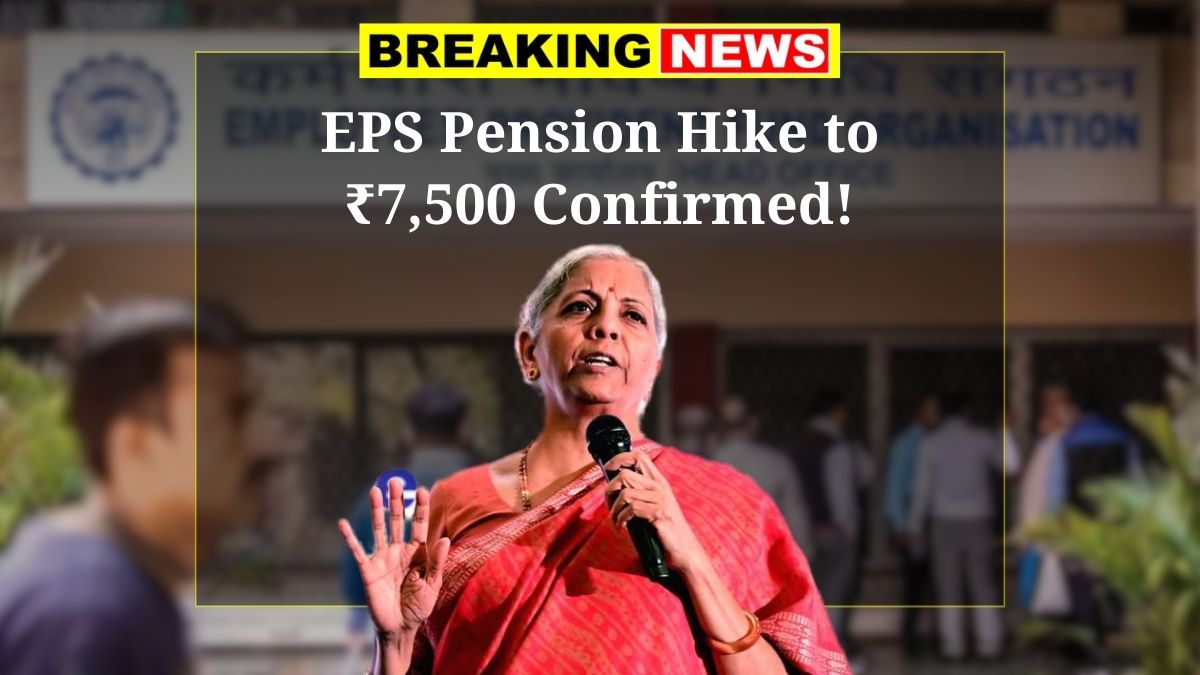The Employees’ Pension Scheme (EPS) is set for a major overhaul that could offer life-changing financial relief to over 75 lakh pensioners across India. The government is considering a proposal to increase the minimum monthly pension under EPS from ₹1,000 to ₹7,500, addressing long-standing demands from retirees and trade unions for a more dignified pension aligned with the rising cost of living.
If implemented, this significant increase will not only enhance the quality of life for senior citizens but also represent a historic reform in India’s social security framework.
What is the Employees’ Pension Scheme (EPS)?
Launched in 1995, the EPS is a social security scheme managed by the Employees’ Provident Fund Organisation (EPFO). The scheme provides monthly pensions to employees who have worked in the organized sector for at least 10 years. Key features include:
- A lifelong pension for eligible retirees.
- A contribution of 8.33% of the employer’s share from the Provident Fund.
- Pension begins at age 58 (or 50 with reduced benefits).
- Nominee/family pension in case of the pensioner’s death.
Why is the Pension Hike Necessary?
Currently, the ₹1,000 monthly pension is insufficient to meet the growing needs of retirees, especially with inflation and rising healthcare costs. Many pensioners, particularly those in lower-income brackets, struggle to make ends meet.
Challenges faced by EPS pensioners include:
- ₹1,000 barely covers monthly medical expenses.
- No adjustment for inflation or increased living costs.
- Lack of family support for many retirees.
Government’s Plan and Policy Discussions
The government has acknowledged the need for a pension increase and is exploring ways to restructure the EPS framework. Discussions between the Labour Ministry, EPFO, and other stakeholders are ongoing. Key elements under consideration include:
- Raising the minimum pension to ₹7,500.
- Linking EPS with an inflation index.
- Increasing government contributions to the scheme.
Who Will Benefit?
The proposed pension hike will benefit a wide range of pensioners:
- Regular EPS retirees: The monthly pension could increase by over 650%, from ₹1,000 to ₹7,500.
- Widows and dependents: Pension amounts could rise to ₹6,000-₹7,000.
- Disabled pensioners: Expected to receive ₹7,500, up from ₹1,000.
- Early retirees: Those with reduced pensions could see an increase to ₹5,500-₹6,000.
The government estimates that over 75 lakh pensioners, including 15 lakh widows and dependents, will benefit from the proposed hike. The total financial impact is expected to be around ₹20,000 crore annually.
Trade Union Demands and Legal Push
Trade unions have been at the forefront of pushing for an increase in the EPS pension. They demand that the pension be raised to ₹7,500 plus Dearness Allowance (DA) and that the scheme be linked with inflation to ensure it remains relevant in the future.
Legal developments have also played a role, with the Supreme Court supporting certain aspects of the EPS-95 amendment. A Parliamentary Standing Committee had previously recommended a minimum pension of ₹3,000, and the current discussions reflect a significant upward revision.
Revised Pension Calculations
Under the proposed changes, pensioners will see a substantial increase depending on their length of service and average salary. For example:
- A retiree with 10 years of service earning ₹15,000 could see their pension rise from ₹1,000 to ₹6,500-₹7,000.
- A retiree with 30 years of service and a ₹30,000 salary could receive ₹7,500 or more.
How Will the Hike Be Funded?
The government is exploring various funding strategies to ensure the EPS pension hike is sustainable. Possible options include:
- Increasing government contributions.
- Utilizing EPFO surplus and returns on investments.
- A gradual rollout, prioritizing older pensioners and those with the lowest incomes.
Expert Opinions
The proposed pension hike has been widely welcomed by pensioner groups, with many seeing it as a long-overdue step toward financial security. However, experts caution that the hike must be backed by sustainable financing models to ensure the long-term viability of the scheme.
What’s Next?
While the hike is not yet officially confirmed, it is expected that the proposal could be announced in the upcoming budget or ahead of the general elections to garner public support. Sources suggest that the final policy review will happen in Q2 2025, with formal notification and phased rollout starting in Q3 2025.
For millions of senior citizens, the proposed EPS pension hike could bring much-needed relief and restore dignity in their retirement years. However, the implementation of these changes will require careful planning to ensure that the fund remains sustainable and that pensioners receive their revised benefits on time.
Pensioners and their families are advised to stay updated through official channels like EPFO and the Ministry of Labour for the latest developments.



